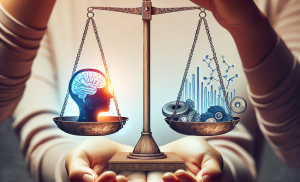Non-Binary Mental Health: Embracing Identity
In this article, you will gain a deeper understanding of the importance of non-binary mental health and the need to embrace one’s unique identity. We will explore the challenges faced by non-binary individuals in maintaining their mental well-being, the impact of societal norms and expectations, and the empowering journey towards self-acceptance. By shining a light on this often overlooked aspect of mental health, we hope to foster a more inclusive and compassionate society for all.
Understanding Non-Binary Identity
Non-binary identity refers to a diverse range of gender identities that do not fit within the binary categories of male and female. People who identify as non-binary may experience their gender as fluid, outside of the traditional male or female spectrum, or a combination of both. Non-binary individuals may use a variety of terms to describe their gender identity, such as genderqueer, genderfluid, agender, bigender, or neutrois.
Challenges Faced by Non-Binary Individuals
Non-binary individuals face unique challenges that can impact their mental health and overall well-being. One of the primary challenges is the lack of visibility and understanding in society. The existence of non-binary individuals challenges the traditional binary understanding of gender, leading to misconceptions and discrimination. This lack of understanding can result in feelings of isolation, rejection, and invalidation.
Additionally, non-binary individuals often face societal pressure to conform to gender norms or choose binary options, which can be invalidating and distressing. This pressure can come from family, friends, peers, educational institutions, workplaces, and healthcare systems. Such invalidation can have a detrimental impact on mental health, leading to increased rates of depression, anxiety, and suicidality.
Impact of Identity on Mental Health
The impact of non-binary identity on mental health cannot be understated. Non-binary individuals often face significant challenges in establishing and maintaining a positive sense of self. The constant invalidation and misunderstanding they experience can lead to a pervasive sense of self-doubt, low self-esteem, and internalized stigma.
The discrepancy between one’s gender identity and the expectations and norms of society can also result in chronic stress and emotional distress. This distress can manifest in various ways, including increased rates of anxiety disorders, mood disorders, substance abuse, and self-harm behaviors. Therefore, it is crucial to address the unique mental health needs of non-binary individuals to promote their overall well-being.
Mental Health Disparities in Non-Binary Individuals
Non-binary individuals experience higher rates of mental health issues compared to the general population. Research indicates that they are more likely to suffer from anxiety disorders, depression, and suicidal ideation. Studies have also found a higher prevalence of self-harm behaviors and eating disorders among non-binary individuals.
Several factors contribute to these disparities. One of the key factors is the lack of access to appropriate mental health care. Non-binary individuals often face barriers in accessing mental health services due to a lack of inclusive and affirming care providers, financial constraints, and limited availability of gender-affirming treatments.
Barriers to Accessing Mental Health Care
Non-binary individuals face numerous barriers when seeking mental health care. Many mental health care providers are not adequately trained to provide sensitive and competent care to non-binary individuals. This lack of knowledge can result in misgendering, invalidation of gender identity, and a lack of understanding of the unique challenges faced by non-binary individuals.
Financial constraints can also prevent non-binary individuals from seeking mental health care. Many insurance policies may exclude coverage for gender-affirming treatments, which can be vital for the mental health and well-being of non-binary individuals.
Intersectionality and Mental Health
Intersectionality plays a crucial role in understanding the mental health disparities faced by non-binary individuals. Intersectionality recognizes that an individual’s identity is shaped by multiple intersecting social categories, such as race, ethnicity, socioeconomic status, disability, and sexual orientation.
Non-binary individuals who belong to marginalized communities may face compounded discrimination and challenges. For example, non-binary individuals of color may experience racism and transphobia, which can significantly impact their mental health. Acknowledging and addressing the intersectional experiences of non-binary individuals is essential for providing culturally competent and inclusive mental health care.
Addressing Mental Health in Non-Binary Individuals
Addressing the mental health needs of non-binary individuals requires a comprehensive and inclusive approach. Mental health care providers, institutions, and society as a whole need to create an environment that supports and affirms non-binary identities.
Creating Inclusive Mental Health Care
Mental health care providers should prioritize creating an inclusive environment for non-binary individuals. This includes using gender-neutral language when addressing patients, ensuring that intake forms and paperwork include options for non-binary individuals, and providing education and training on non-binary identities and experiences.
Supporting Affirmation and Identity
Supporting the affirmation and exploration of non-binary identity is vital for the mental health of non-binary individuals. Mental health care providers can help non-binary individuals navigate their gender identity journey, providing a safe and affirming space to discuss their experiences and challenges. This support can foster a sense of validation, self-acceptance, and empowerment.
Importance of Language and Pronouns
Using the correct pronouns and respectful language is essential when interacting with non-binary individuals. Respecting an individual’s chosen name and pronouns is a simple yet significant way to show support and validation. Mental health care providers should ensure that their practice is informed about gender pronouns and actively incorporate this knowledge into their daily interactions with non-binary patients.
Importance of Community and Support
For non-binary individuals, finding community and support is crucial for mental health and overall well-being. Building connections with others who share similar experiences can provide a sense of belonging, reduce feelings of isolation, and offer opportunities for validation and support.
Role of Supportive Communities
Supportive communities play a vital role in the mental health of non-binary individuals. Online and offline spaces dedicated to non-binary individuals can serve as a source of support, information, and validation. These communities can facilitate connections with like-minded individuals, allowing non-binary individuals to share their experiences, seek advice, and find encouragement.
Finding Safe Spaces
Non-binary individuals often face discrimination and invalidation in various social settings. Therefore, finding safe spaces where they can freely express their identity without fear of judgment or backlash is crucial. These safe spaces can include LGBTQ+ community centers, support groups, or even specific events or organizations that cater to non-binary individuals.
Building Social Connections
Developing social connections is essential for non-binary individuals’ mental health. Building relationships with friends, family members, or partners who are supportive and understanding can provide a strong support network. Social connections can help combat feelings of loneliness, develop coping strategies, and offer valuable perspectives and insights.
Navigating Mental Health Services
Navigating mental health services can be challenging for non-binary individuals due to barriers and limited options. However, there are strategies that can help overcome these challenges and ensure access to appropriate care.
Advocating for Inclusive Mental Health Services
Non-binary individuals and their allies can advocate for the inclusion of non-binary identities in mental health services. This can include lobbying for policy changes, raising awareness about the unique mental health needs of non-binary individuals, and demanding better training and education for mental health care providers.
Seeking Culturally Competent Providers
When seeking mental health care, it is crucial for non-binary individuals to find providers who are knowledgeable and affirming of non-binary identities. This may involve researching providers, asking for recommendations from trusted sources, or seeking out specialized clinics or organizations that cater to the LGBTQ+ community.
Mental Health Resources for Non-Binary Individuals
Numerous mental health resources are specifically designed for non-binary individuals. Online forums, helplines, and organizations cater to the unique needs of non-binary individuals and provide information, support, and guidance. Utilizing these resources can help non-binary individuals access the mental health care they need and find the support they deserve.
Self-Care Strategies for Non-Binary Individuals
Self-care is vital for everyone, including non-binary individuals, to support their mental health and well-being. Developing self-care strategies can help non-binary individuals navigate the challenges they face and promote resilience and self-empowerment.
Recognizing and Validating Emotions
Emotional awareness and validation are crucial for non-binary individuals. Acknowledging and accepting one’s emotions, whether positive or negative, can help in processing and coping with them effectively. Non-binary individuals can benefit from practices such as journaling, mindfulness, or talking to a trusted friend or therapist about their feelings.
Developing Coping Mechanisms
Developing healthy coping mechanisms is key to managing stress and maintaining mental well-being. Non-binary individuals can explore various coping strategies, such as engaging in creative activities, exercising, practicing relaxation techniques, or seeking professional therapy or counseling.
Prioritizing Self-Care
Non-binary individuals should prioritize self-care practices to nurture their mental health. This includes setting boundaries, practicing self-compassion, engaging in activities they enjoy, and taking time to rest and recharge. Prioritizing self-care allows non-binary individuals to care for themselves and create space for personal growth and well-being.
Educating Allies and Professionals
Education and awareness play a vital role in supporting non-binary individuals’ mental health and fostering inclusivity in society. Allies and professionals in various fields can contribute to this by seeking knowledge and understanding about non-binary identities and experiences.
Dispelling Myths and Stereotypes
Educating allies and professionals involves debunking myths and stereotypes about non-binary individuals. Common misconceptions, such as the idea that non-binary individuals are confused or just seeking attention, can contribute to the invalidation and marginalization of non-binary identities. By dispelling these myths, society can begin to create a more accepting and supportive environment for non-binary individuals.
Training and Education for Mental Health Providers
Ensuring that mental health care providers receive appropriate training and education about non-binary identities is crucial. This can include topics such as gender diversity, transgender and non-binary mental health, and culturally competent care. By equipping mental health providers with the knowledge and skills needed to support non-binary individuals, we can improve the quality of care and create a more inclusive mental health system.
Supporting Non-Binary Individuals in Everyday Life
Allies can also support non-binary individuals in their everyday lives by challenging gender norms and using inclusive language. By using correct pronouns and respecting individuals’ gender identity, allies can contribute to a more affirming and validating environment. It is essential to remember that small acts of support can make a significant difference in the lives of non-binary individuals.
Promoting Empowerment and Resilience
Promoting empowerment and resilience is vital for non-binary individuals to thrive in a society that may not fully understand or accept their gender identity.
Celebration of Non-Binary Identity
Promoting the celebration of non-binary identity helps non-binary individuals develop a positive sense of self and pride in their gender identity. Society can support this by actively embracing diversity and amplifying non-binary voices and experiences. Non-binary individuals can also find empowerment by connecting with their community and engaging in advocacy work.
Empowering Self-Advocacy
Encouraging non-binary individuals to advocate for themselves and their needs is crucial. Self-advocacy involves asserting one’s rights, needs, and boundaries in various contexts, such as healthcare, education, and employment. By empowering non-binary individuals to speak up and assert themselves, we can help create a society that values and respects their identities.
Promoting Resilience and Strength
Resilience is the ability to bounce back from challenges and adversity. Promoting resilience in non-binary individuals involves providing support, resources, and tools to help them navigate the difficulties they may face. This support can include mental health services, access to affirming spaces, and fostering a sense of community and belonging.
Legal and Policy Implications
The legal and policy landscape plays a significant role in shaping the experiences of non-binary individuals and their access to mental health care.
Recognition and Protection of Non-Binary Individuals
Legal recognition and protection of non-binary individuals’ gender identities are essential for their mental health and overall well-being. Policies that explicitly recognize non-binary identities, allow for changes in legal documents, and protect against discrimination based on gender identity can create a more inclusive society.
Changing Legal and Healthcare Systems
The legal and healthcare systems need to be transformed to better support non-binary individuals. This includes updating policies, forms, and documentation to include non-binary options, as well as providing gender-affirming healthcare that is accessible and covered by insurance.
Policy Recommendations for Inclusion
Advocacy efforts should focus on developing and promoting policy recommendations that promote the inclusion of non-binary individuals in all aspects of society, including mental health care. These recommendations can address areas such as education, healthcare, employment, housing, and legal recognition. By advocating for policy changes, we can create a more equitable and just society for non-binary individuals.
Research and Future Directions
Research plays a vital role in understanding the mental health needs of non-binary individuals and identifying ways to address these needs effectively.
Identifying Gaps in Research
There is a need for further research to fill existing gaps in our understanding of non-binary mental health. More comprehensive studies are needed to explore the unique experiences, challenges, and resilience factors within the non-binary community. This research can provide the foundation for developing evidence-based interventions and support services.
Tailoring Research to Non-Binary Individuals
Research studies should be designed to include non-binary individuals specifically instead of solely relying on data from cisgender or transgender populations. By centering non-binary voices and experiences, we can gain a deeper understanding of their mental health needs and develop targeted interventions.
Advancing Mental Health Understanding
Continued research is crucial for advancing mental health understanding and support for non-binary individuals. Ongoing efforts in research can contribute to destigmatizing non-binary identities, improving mental health outcomes, and advocating for policy changes to promote inclusivity and acceptance.
In conclusion, understanding and addressing the mental health needs of non-binary individuals require a multi-dimensional approach. By promoting inclusivity, providing affirming and accessible mental health care, building supportive communities, and advocating for legal and policy changes, we can create a society that embraces non-binary identities and fosters mental well-being for all individuals.

















